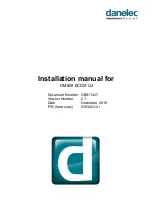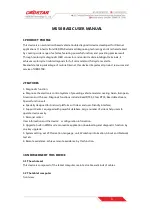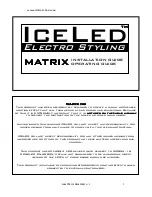
20 / 36
1566g GB/2019-02
1
electronic GmbH & Co. KG • Heinrichstraße 3-4 • 12207 Berlin • Deutschland • [email protected]
4.3
Treatment of medical and dental instruments
• The disinfection and cleaning of medical instruments in a single step follows the general
sonication procedure, see chapter 4.2.
• A combined disinfection and cleaning of medical instruments in the ultrasonic bath is only
possible with the use of special preparations (with the corresponding microbiologic certi
fi
cates).
An ultrasound alone will not disinfect them!
• Only disinfection agents and/or detergents that are non-af
fi
xing may be used.
• In terms of concentration, temperature, and sonication time, the manufacturer speci
fi
cations for
the disinfection agent and/or detergent used are to be strictly adhered to.
• The compatibility between the instrument and the preparation is to be veri
fi
ed on the basis of
the respective manufacturer's speci
fi
cations.
• The service life of the disinfection solution pursuant to the manufacturer speci
fi
cations is to be
heeded.
The cleaning solution is to be immediately replaced if contamination is evident. It is to be
replaced, however, at least every work day.
• Prepare instruments appropriately, e.g. by rinsing them with cold water of at least drinking
quality, fully separating / opening them!
Adhere to the instructions of the respective instrument manufacturer.
• Operate the ultrasonic bath with a lid or below and/or atop a suctioning system.
• Further treat instruments after sonication in accordance with KRINKO recommendations
/4
. In
other countries, the relevant supplementary/divergent national regulations should be taken into
account.
• Adhere to OSHA safety measures (e.g. protective clothing, protective goggles, suitable gloves).
Special case "thorough cleansing"
In the case of stained, crusted or oxidised instruments, a thorough cleansing is recommended.
The thorough cleansing is carried out as indirect sonication in a plastic insert tub, using a special
detergent (see chapter 7.2).
/4 In Germany: Empfehlung der Kommission für Krankenhaushygiene und Infektionsprävention (KRINKO) beim Robert Koch-Institut (RKI)
und des Bundesinstitutes für Arzneimittel und Medizinprodukte (BfArM); Bundesgesundheitsblatt - 2012•55:1244-1310.
















































